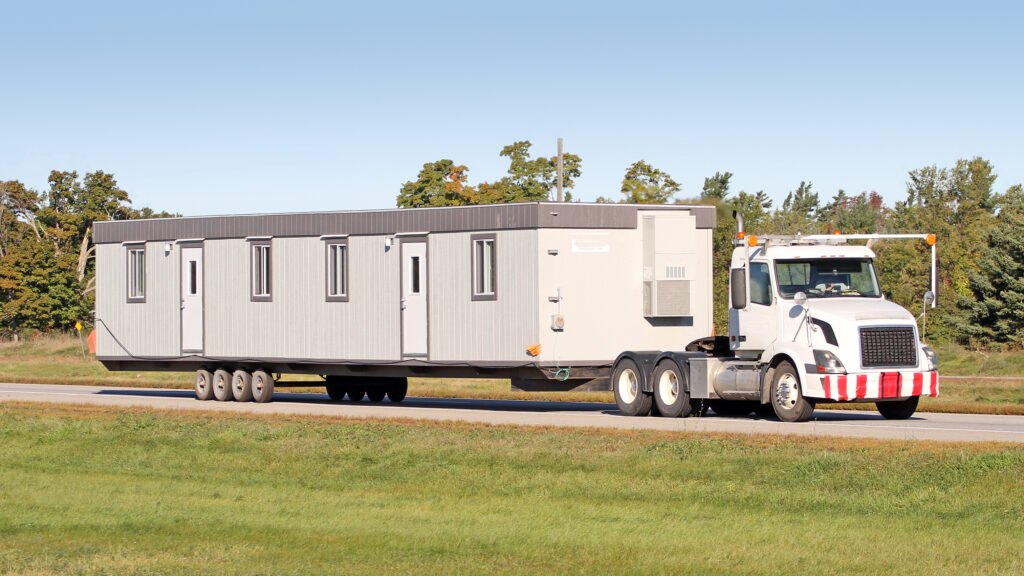
Is a Mobile Home Real Property: A Strained Relationship
Since the invention of the mobile home, everyone has struggled with the relationship these homes have to real property. Is the mobile home part of the real property? Is it personal property and if so, when and how does it become real property?
Is a Mobile Home Considered Real Property?
A mobile home is a personal property, registered with the Division of Motor Vehicles (“DMV”) in the same fashion as a vehicle. It has a title registered with DMV and ownership is transferred in the same manner as a vehicle. In a sense, the mobile home is a car and remains so unless it’s transformed into a part of the real property upon which it sits. If an individual owns a parcel of land and owns a mobile home located on that land, he or she has two separate property interests; one in real property (the land) and the other in personal property (the mobile home). If he or she were to sell the land, the title to the mobile home would not transfer to the new owner through the deed. The mobile home must first be converted into real property.
Affixing a Titled Mobile Home to Real Property
If a mobile home is to be affixed to real property, thus becoming part of the real property, a few steps must be taken. The mobile home should be made a permanent fixture on the land. The hitch, wheels and axels should be removed, and the home should be placed on a permanent foundation. Further, the owner must submit an Affidavit for Removal of Manufactured Home from Vehicle Registration Files (DMV form MVR-46G). This affidavit verifies that the mobile home meets the definition of real property and the owner is surrendering the certificate of title. Once the affidavit is submitted to DMV, the agency will cancel the certificate of title and declare the mobile home real property. However, if there is an outstanding lien on the title, DMV cannot cancel the title without written consent from the lienholder. See N.C. Gen Stat. § 20-109.2. After recording with DMV, the affidavit must be recorded with the Register of Deeds of the county where the real property is located. Once recorded with the Register of Deeds, the mobile home becomes an improvement or fixture to the real property. Recording of the affidavit with the Register of Deeds provides notice to anyone searching the land records that the mobile home is now part of the real property. Once the mobile home is affixed to the land, all existing liens on the real property become liens on the mobile home and no future lien can be granted on the mobile home unless also granted on the real property. See N.C. Gen Stat. § 47-20.6. The mobile home is now part of the real property in the same manner as a house constructed on that land. A transfer of interest in the land will also transfer the interest in the mobile home.
Affixing an Untitled Mobile Home to Real Property
Some mobile homes have never been titled with DMV. This most often happens when someone purchases a mobile home to place upon the land he or she already owns and never takes the steps required to have the mobile home titled with DMV. When purchased, a mobile home comes with a Certificate of Origin. This is like the birth certificate for the mobile home. But this Certificate of Origin is not a title and unless the owner submits a title request to DMV, no title is ever issued. So, it’s possible to have a mobile home located on real property that has no title. Since there is no title to cancel, how can the home become part of the real property?
Owners of real property on which an untitled mobile home has been placed may record a Declaration of Intent to Affix the mobile home to the real property with the Register of Deeds in the county where the real property is located. Once the declaration is recorded with the Register of Deeds, the mobile home will be considered an improvement to the real property. As in the case of a mobile home with a canceled title, the transfer of an interest in the land will also transfer the interest in the mobile home. The declaration is only effective to affix untitled mobile homes to real property. If there is a title registered with DMV, the recording of the declaration will not transform the mobile home into real property. The title must be canceled.
Lender’s Right to Foreclose a Mobile Home as Part of Real Property
So, what does this mean for a lender who holds a lien on the real property and wants to foreclose? When can a mobile home be included as a part of the real property in a foreclosure action? As discussed above, if the title has been canceled or a Declaration of Intent to Affix has been recorded on an untitled mobile home, the mobile home is considered real property and foreclosure of the land will include the mobile home. But it is common for a lender to discover that the mobile home located on its real property collateral has an outstanding title with DMV and perhaps even with liens docketed on that title. At that point, can a lender, who holds a valid deed of trust on the real property, foreclose the mobile home as a part of the real property? North Carolina law provides a mechanism in which the mobile home may be included in a real property foreclosure.
When the owner of a tract of land is the same as the owner of the mobile home located on that land, and the lienholder on the land and the mobile home is the same, the law presumes that the owner placed the mobile home on the land intending for it to become a part of the land and additional collateral for repayment of the loan. See Hughes v. Young, 115 N.C. App. 325, 329 (1994); Hensley v. Ray’s Motor Co. of Forest City, Inc., 158 N.C. App. 261 (2003). If Mr. Jones is the owner of real property and the titled owner of the mobile home located thereon, and Bank A holds a lien on the real property and also on the mobile home title, Bank A can foreclose the mobile home as a part of the real property. In this situation, the legal description used in the foreclosure should be revised to include the following or similar language:
Included in the real property is a __________________ (Model Year) mobile home, Vehicle Identification Number ____________________, which is affixed to the real property. This mobile home is being sold as a part of the real property as is permitted by the provisions of N.C.G.S. §25-9-604.
Also, N.C. Gen Stat. §25-9-604(a) provides that
“If a security agreement covers both personal and real property, a secured party may proceed:
(2) As to both the personal property and the real property in accordance with the rights with respect to the real property, in which case the other provisions of this Part do not apply.”
Further, N.C. Gen Stat. §25-9-604(b) provides that
“… if a security agreement covers goods that are or become fixtures, a secured party may proceed:
Under this Part; or
In accordance with the rights with respect to real property, in which case the other provisions of this Part do not apply.”
But the mechanism built into North Carolina law requires the lender to have a lien on the title to the mobile home. It is common at the inception of the loan that the lender does not record a lien on the title, either because it or the closing attorney was unaware of this requirement or perhaps because the lender didn’t realize a mobile home was located on the property. If there is a title to a mobile home, and the lender has no lien on the title, the lender has no lien on the mobile home. This can be extremely costly to a lender whose loan was approved based on the value of both the land and the mobile home. Thus, it is important that a lender not only properly secure its lien on the real property by a recorded deed of trust but also its lien on the mobile home with DMV. Otherwise, the lender may not have the collateral it thought it had.
Beyond the failure to record its lien with DMV, a lender could encounter even more complicated issues. It’s possible the borrower is not the titled owner of the mobile home because he or she failed to have the title transferred from the previous owner. There could be existing liens docketed on the title that if not removed, would be superior liens. So, if a titled mobile home is intended as part of the collateral for a loan, steps must be taken at the inception of the loan to investigate the status of the title with DMV and to ensure the lender’s lien is docketed on the title. Otherwise, the lender may find that it has no security interest in the mobile home.
Mobile homes and real property have always had a strained relationship. Understanding this relationship can help avoid complications and ensure that a loan is secured by the property intended. Where a mobile home is involved, determining its status as real or personal property is essential.

